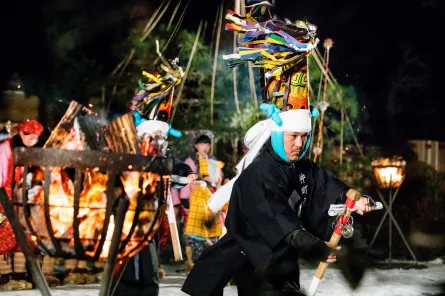Shinto (神道, the way of the gods or the way of the divine) or Shintoism is a set of beliefs dating from the ancient history of Japan, sometimes recognized as a religion. It mixes polytheistic and animistic elements.
From time immemorial, the Japanese have worshiped kami — spirits that inhabit or represent a particular place, or embody natural forces like wind, rivers, and mountains. Each time a village was created, a sanctuary was erected to honor the surrounding spirits and thereby ensure their protection. It was believed that kami could be found everywhere, that no place in Japan was beyond their power. Shintoism therefore encompasses the doctrines, institutions, rituals and community life based on the worship of the kami.

Contents
ToggleShinto festivals
Holidays of the month
February 3, 2025 (1 event)
February 3, 2025

Today, the Japanese celebrate Setsubun, the ancient Japanese lunar new year. This early spring festival is an opportunity to scare away the oni and bring good fortune. #mythology #myth #legend #calendar #3February #oni #Japan #setsubun
February 17, 2025 (1 event)
February 17, 2025

Today, in the north of Japan, Hachinohe Enburi takes place. The festival features a series of traditional folk dances that are performed to herald the end of northern Japan's long and often harsh winter and usher in the coming of spring while praying for a successful planting and harvest season to come. Given these ongoing risks of famine, the festival has long become a particularly important form of imploring for a bountiful harvest. #mythology #myth #legend #calendar #February 17 #EnburiMatsuri #Hachinohe #HachinoheEnburi #Japan
February 25, 2025 (1 event)
February 25, 2025

Today, the Japanese of Kyoto celebrate Kitano baikasai, the plum blossom festival. A thousand-year-old celebration, it is the occasion of a giant tea ceremony and marks the death of Sugawara no Michizane, a famous scholar and poet who was exiled by the Fujiwara clan. #mythology #myth #legend #calendar #February 25 #Japan #Kyoto #Kitano #Baikasai #Michizane
Cultural areas of Shintoism
Shintoism is an animist religion. The major concept of Shintoism is the sanctity of nature. The resulting deep respect defines the place of man in the universe: to be an element of the great All. Thus, a watercourse, a star, a charismatic character, a simple stone or even abstract notions such as fertility can be considered as divinities. Respect for ancestors and feelings of communion with the forces of the universe and past generations are the spiritual bases of Shinto.
Issued from the cosmic Unity, the flows founding life are embodied in a multitude of kami. The polytheism that emanates from it is infinite, in the sense that each particle of life is sacred. Shinto mythology says that there are 8 million kami Happyakuman (八百万?) because the kanji are also read yaoyorozu, meaning a myriad, that is to say an indefiniteness, an unquantifiable number. By descending to Earth to breathe life into it, the kami created the Japanese archipelago.
Countless, the kami are everywhere, hiding in the most diverse forms, in the most unexpected places. It is therefore advisable to be extremely careful with them, especially since the smallest are sometimes the most susceptible. Their character is ambiguous, like nature itself. All of them, including the best among them and the greatest, possess a "spirit of violence", arami-tama (荒御魂), which must be reconciled or neutralized by appropriate rites.
Some are even dangerous in their principle, such as the "gods of epidemics" or the "gods of insects", predators of rice. All can hit you with a Tatar (祟り). The old definitions that are given of it have a more physical than moral character: it is thus that contact with death, blood, excrement provokes ritual defilement; but life in society will lead to a broadening of this notion of tsumi, and certain social offenses will be qualified as such (destruction of a dyke of rice fields).
In principle, however, the tsumi, like the tatari which is its almost automatic consequence, seems to have to be defined in a way that is both more vague and more general. Numerous examples, even recent ones, indeed show that one can be struck by a Tatar as long as one has encroached, even unconsciously, on the domain of a kami; the tsumi is in short the transgression of certain limits, not always formally prohibited or specified, but charged with a formidable magical potential due to the mere presence of the kami.
Purification rituals are of singular importance in Shinto belief. To escape the consequences of an imprudently incurred tatari, it is necessary to "purify" those around you (祓う) or yourself (清む). These two terms are used to define the usual actions of cleaning "sweeping, cleaning, washing", and other more symbolic with ritual ablutions.


